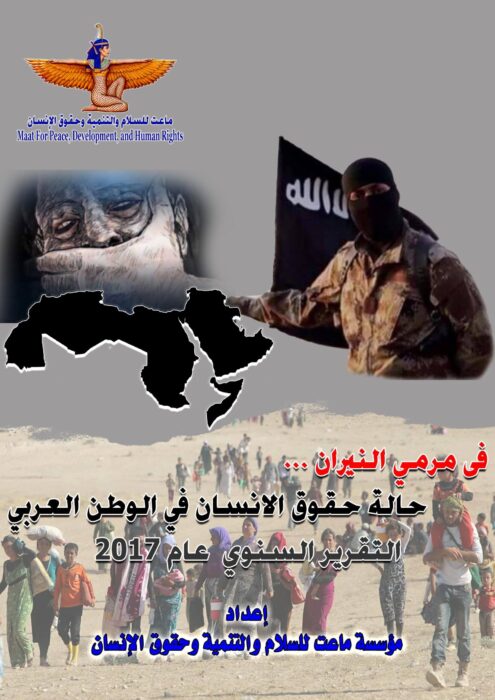On the side of Maat’s Participation in the 38th Session of the Human Rights Council in Geneva,
Maat launches the Human Rights Situation Report in the Arab Region 2017
As a part of its participation in the 37th session of the Human Rights Council in Geneva, the Maat for Peace, Development and Human Rights launched its first report to monitor and assess the human rights situation in the Arab region. That report is covering the 2017 period.
Ayman Okeil, General Director of Maat, said that the report is based on an integrated methodology. Also, focusing on the Arab states’ position on the UN mechanisms for the protection of human rights in 2017. Whether at the level of human rights treaty committees, and Special Rapporteurs, or the universal periodic review. As well as, this report presents the general features of the human rights situation in the Arab countries.
Okeil also pointed out that the report pays a special attention to armed conflicts and their impact on human rights. In addition to other issues like the issue of terrorism, violence and extremism, the Palestinian issue and the occupation of the Arab territories by Israel.
The Arab region has witnessed a continuation of the armed conflict in Libya, Syria and Yemen in 2017, and increasing of the interference by foreign forces in those and other countries. The level of violence and terrorism continued to rise, as well it became clear that there are some countries and governments in the region were standing behind the terrorist organizations. Also, they provided these terrorist organizations with the political, financial and logistical support.
On the other hand, public freedoms in the region have still witnessed a noticeable decline, and the right to freedom of peaceful assembly has still faced many restrictions. There have also been increasing restrictions on the available space where civil society’s activities are held. And some Governments have continued to impose systematic and arbitrary restrictions on the exercise of the right to freedom of expression.
The report includes four sections; the first section discusses the position of the Arab countries on human rights mechanisms; the second section includes the human rights situation in the Arab region; while the third section focuses on the armed conflicts in the region; and the last “forth” section deals with combating terrorism and its impact on human rights.
Moreover, the report was based on papers that were prepared by Maat’s researchers, and relied heavily on documented information that available through local sources. As well as evaluations, observations, and information were provided by human rights experts from some of the countries under study.
The report revealed that there 13 Arab countries were required to submit reports to the committees with the human rights certificate in 2017. From these countries, which are required to give reports, there only nine reports have already been submitted, while the other eight Arab countries didn’t submit their required reports.
Concerning the Special Rapporteurs, some of them submitted Complaints and statements concerning the human rights situations in some countries, notably Libya, Bahrain and Egypt. A large number of these complaints were answered in the case of Egypt and Bahrain, while the responses were lower in the case of Libya. As well as, there are five Arab States that subjected to the universal periodic review mechanism.
Also, the report referred to that the Middle East region in general and the Arab region in particular were among the highest in the world in terms of terrorism. According to the World Terrorist Index, Iraq was ranked as the highest country in the world in terms of the number of terrorist operations and the number of casualties during 2017. Followed by Syria, Yemen, Egypt and Libya. While, Morocco came at the last three ranks with the Sultanate of Oman and Mauritania.
Furthermore, the report reviewed the situation of armed conflicts in some Arab countries and their negative impact on human rights, especially, in Syria, Libya, Yemen and Iraq. The report also reviewed and analyzed the ongoing violations of the Israeli occupation army in the occupied Palestinian territories.
![]()
 |
shortlink: https://maatpeace.org/en/?p=23823












